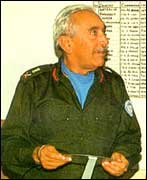 | « Back to article | Print this article |
Lieutenant General Dewan Prem Chand, who played a critical role in bringing peace to vast tracts of Africa, died on Monday at the Army Base Hospital in Delhi at the age of 87.
in bringing peace to vast tracts of Africa, died on Monday at the Army Base Hospital in Delhi at the age of 87.
The general had, after a long and eventful career, withdrawn to a cottage in Mussoorie, Uttaranchal, which did not have a telephone, television, or even a proper approach road, but offered a fantastic view of the Himalayas.
Gen Prem Chand made a name for himself as commander of United Nations peacekeepers in Africa. In his first posting with UN forces in the early 1960s, he retrieved the Katanga province, which was trying to secede, for the Congo. It remains a rare case in which UN peacekeepers managed to keep a fractured country united. Those who stood in the way were not just local rebels but several World War II veterans and retired soldiers from France and Belgium, who were acting as mercenaries.
Gen Prem Chand was clear about the role of the Blue Berets. He always said peacekeeping depends on three factors: preventing conflict, preventing conflict, and preventing conflict. "If you have to have peace, then you have to start looking after it," he said, warning that in any peacekeeping role "you have to deal with the unexpected every moment of the day".
The general himself dealt with the unexpected with great élan. For proof, one only needs to look at the political map of Africa. He worked to keep the Congo united, restored peace in a deeply divided Cyprus, acted as a midwife in Rhodesia's rebirth as Zimbabwe, and helped bring freedom to Namibia.
Prem Chand retired from the Indian Army in 1967 as a major general. But Africa, struggling to emerge from centuries of colonialism and coveted by many for its natural resources, still needed him. In 1969, in an extraordinary move, the UN appointed him head of its peace-keeping force in Cyprus. Gen Prem Chand was placed at the head of a force that had no Indian troops.
As 40,000 soldiers of the Turkish army attacked Cyprus, the UN force under Gen Prem Chand continued to work for peace. In the end, he emerged triumphant. For this extraordinary command, the Indian Army awarded him the rank of lieutenant general.
In 1980, Africa beckoned again. This time Gen Prem Chand's services were sought not as a military commander, but to negotiate Rhodesia's future with Rogert Mugabe, the British, and other players. He eventually succeeded in ushering peace to a land torn by violence through the late 1970s.
But what the general would call his biggest, most successful operation was yet to come. For 10 years he lived out of a suitcase, crisscrossing Africa, Europe, and the rest of the world negotiating the birth of Namibia. Peacekeeper that he was, Gen Prem Chand brought together France, Germany, Britain and Canada to help in the birth of a democratic Namibia.
The tough old soldier recalled how Western troops in the UN Transition Assistance Group for Namibia, which he headed, faced unexpected challenges. Besides rebels, the troops had to deal with cerebral malaria and saline water. Those who dared jump into the big rivers to escape the sun risked being eaten by crocodiles. Nothing, however, deterred Gen Prem Chand.
When the general spoke to rediff.com in 2000 about his African missions, he sounded content. The lack of regrets in life, he said, was because of happenstance. "The good Lord was holding my hand all the time," was how he put it.
The general had his own parameters for peace, the Mussoorie cottage being one of them. The surrounding tranquillity was his companion while a radio served as his ears to the world.
The world for him was one "big family" and whatever he did was to "save succeeding generations from the scourge of war".